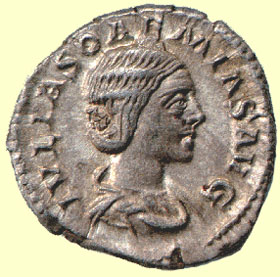 Contents -
Previous Article -
Next Article
Contents -
Previous Article -
Next Article
Julia Soaemias was the younger daughter of Julia Maesa and niece of Julia Domna, the two formidable women of the Severan period who played a decisive role in Roman politics of the times. Soaemias was also the mother of the emperor Elagabalus. Just as his grandmother and her sister were two of the most strong willed, ambitious, and powerful women in Roman history, Elagabalus was a weak and irresponsible emperor. He was more interested in pursuit of sexual excesses and pleasure than ruling the huge Roman empire and building a stable government.
Julia Soaemias was at once the tool of her mother’s political ambitions and the victim of the Roman people’s outraged reaction to Elagabalus’ abuses. She did nothing to influence her son to govern well, but joined in the scandalous behavior by shamelessly taking a series of lovers in full public view herself.
Elagabalus became emperor in A. D. 218 after an army raised and paid for by Maesa had defeated Macrinus. The two women and the boy emperor decided to make up a story that Elagabalus was the illegitimate son of Caracalla, who was murdered in 217 but was still very much loved by the Roman troops. Using this as a just cause and after paying the troops generous bonuses, the two women led them on the battlefield to overthrow the forces of Macrinus. In the critical part of the battle, both women jumped out of their litters and personally urged their legions on to victory from the front lines.
Homosexuality was quite common in Roman society at that time, and Elagabalus had a succession of boyfriends. He even went so far as to take a "husband" in a formal wedding ceremony. Elagabalus also took and quickly divorced three wives. One of these ladies was a Vestal Virgin, symbol of the home and motherhood sacred to the Roman people. This act shocked even the jaded Roman upper classes, and helped to bring about the boy emperor’s downfall. Elagabalus considered his role as high priest of the sun god to be more important than his role as Roman emperor.
In A. D. 222, Julia Maesa finally decided to do away with her daughter and grandson before the army raised up a general in one of the provinces to the throne. She had Elagabalus adopt his thirteen year old brother and make him heir to the throne. The boy , Bassianus, seemed to be the exact opposite of Elagabalus and was well - liked by the soldiers of the Praetorian Guard. Maesa persuaded Elagabalus to give his brother a greater role in governing the empire so that he could devote more time to serving his god. Elagabalus soon grew suspicious of his brother, though. When it seemed that Elagabalus was going to have Bassianus murdered, the Praetorians invited the boy, his mother Mamaea, and Maesa to the safety of their camp. The frightened Elagabalus tried to work out a bargain, and the angry soldiers allowed him to remain emperor only if he gave up the worst of his male favorites who occupied important government posts. This he agreed to do, and both boys were elected consul. This kind of arrangement, when one considers the rest of Roman history and the fate of emperors who fall from favor with the army, would seem a miraculous escape from death. Elagabalus, not satisfied with the gift of his own life, began to have second thoughts and renewed plans to murder his brother. When he refused one day to appear in public with Bassianus, the Praetorian Guard lost all patience. They raised the boy Bassianus to the purple and he became the Roman emperor Severus Alexander. They rampaged through the palace searching for Elagabalus and found him and Julia Soaemias in each others’ arms hiding in a palace privy, clinging to one another in fear. The soldiers quickly killed the pair. They dragged the corpses of the seventeen year old Elagabalus and his still-beautiful but hated mother through the streets of Rome to the shouts and derision of the people. After they unsuccessfully tried to dispose of the bodies in a city sewer, they weighted both of them with stones and cast them into the Tiber.
Go to next article: on Julia Mamaea
Go back to previous article: on Julia Maesa